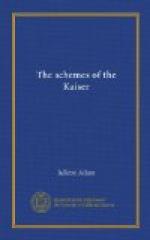September 11, 1891. [13]
William II makes every effort to keep the Triple Alliance on its legs (it being as lame as himself) whilst he continues to give vent to his triple hoch! and resumes once more his rushing to and fro, so wearisome to his faithful subjects, which compels the European Press to groan so loudly that his pennon (Imperial in Austria, or Royal in Bavaria) waves madly about his excited person. Meanwhile the Emperor Alexander III, calm in the serenity of his nature, takes his rest in the pleasant retreat of Fredensborg, where he finds contented virtues and the joys of family life.
It really looks as if a certain deviltry were at work against William II. His splendid statecraft now revolves about questions of rye bread, Russian geese, and American pork; he struggles amidst a mass of difficulties more comic than sublime. He has imposed a system of rigid protection in order to entangle his allies in a net of tariffs favourable only to Germany, and now behold him, all of a sudden, removing the duties off diseased pork, all for the profit of the McKinley Bill, the scourge of Germany. Only the future can say what dangers await a policy of fierce protection and dangerous favouritism. How much simpler and cleverer it would have been to remove the duties on cereals! As far as the people are concerned, cheap pork will never appeal to them as cheap bread would have done. The progressive party had asked for both; the satisfaction they have received appeases them for the moment, but the socialists will still be able to say that William’s Government takes off the duties on foodstuffs that poison the people, and leaves them on those which would afford them healthy nourishment.
September 27, 1891. [14]
William II has decidedly no luck when he puts the martial trumpet to his lips. It was at Erfurt that he learned that the tribes of the Wa Hehe had massacred Zalewski’s expedition into East Africa. It is said that, on hearing this news, the German Emperor, seized with one of those sudden outbursts of rage which throw him into convulsions, swore to avenge in torrents of blood the insult thus suffered by the ever-victorious banner of Prussia. Are we, then, to see the Reichstag in its turn, like the French and Italian Parliaments, wasting its millions and its men in colonial adventures?
At Muenich, William II has declared that the wretched condition of the artillery in the Austrian army, the lack of cohesion in its infantry, and the inexperience, not to say incapacity, of its officers, render it unfit for war in the near future, and that no hope of its improvement is to be entertained, so long as it shall have as its head a man so completely worn out as Francis Joseph. Germany’s armament is to be completely changed and renewed, and it is even said that William will go down in person to the Reichstag during the autumn session to demand the enormous credits which the situation requires. The Neue Muenchen Tageblatt has been seized at Muenich for having published an attack upon “the mania for armaments and for military pomp which possesses William II, a mania which is exhausting Germany and will leave her completely ruined after the next war.”




